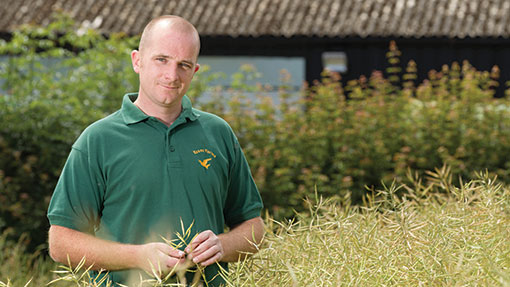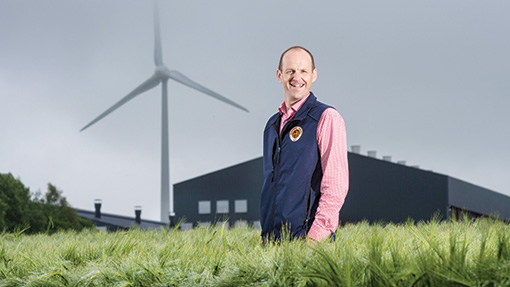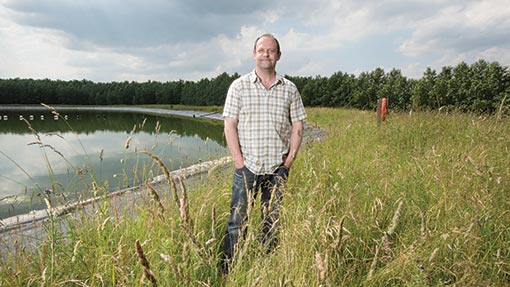2014 Farmers Weekly Farm Manager finalists revealed

All of our farm manager finalists demonstrate excellence in their fields, running complex businesses with a wide range of enterprises.
They make big decisions which must balance the resources of the business to profitably produce exactly what their markets demand.
Keith Daly
Essex Farms, Essex

Adding value is a priority for Keith Daly and his team at Essex Farms, near Ongar.
That might involve extra effort to secure a premium or a specialist crop contract, or it could be weighing up an investment decision to develop the farm infrastructure.
He is charged with farming to the highest standard, both financially and environmentally, for Saker Estates, a London-based property investment fund. The fund has been buying UK farmland, mainly in East Anglia, for several years.
As well as the owned land of 1,980ha spread across five farms, he runs a further three contract farming agreements (CFAs) on 580ha. This means there is a 27-mile drive between the outer edges of the land he manages. So good planning and logistics are critical to ensure time is not wasted on the road.
Farm facts
- 1,980ha owned, additional 580ha on three contract farming agreements
- Arable and property business
- Wheat, barley, oats, oilseed rape, beans, potatoes, thatching straw
Managing change
Changes in the five years since he became manager include the construction of a 4,500t grain store, just in time for harvest 2014, alongside an existing 2,000t store. This has condensed four satellite stores into a central facility with a 100t/hour dryer and rotary cleaner.
Planning permission has also been granted for a large fishing lake and two stock ponds near an existing 6ha reservoir. A new contract farming agreement has also been secured. However, it’s not a case of more acres at any cost.
“We stepped away from another [CFA] as we were unable to structure an arrangement in the best financial interests of our own business,” says Keith.
Other existing long-term contract farming agreements were renewed for a further three years. It’s to his great credit that two of the CFAs stipulate that the deal is only on while Keith is in his job.
“My bosses are not farmers – and that’s a strength because it’s changed my way of looking at the business. They want to make a profit out of it, but they are willing to invest in it, too.”
On their behalf, Keith has examined and rejected many opportunities because while they may have made money, they weren’t right for the business. These include daffodils, cauliflowers, short-rotation coppice, asparagus and recycling.
He has an assistant manager, four arable craftsmen, two general builders, two office support staff and up to nine casuals at harvest.
Aiming high
“We’ve got a very motivated bunch; they all understand the challenges we have and know where we’re aiming – we must be drilled up by the end of the first week in October. We have to produce the best-yielding and best-looking crops, as well as caring about the overall appearance of the farms.”
There is an annual appraisal and a half-yearly bonus based on individual and business performance. Team members are encouraged to use their initiative – for example, sourcing best prices for parts and inputs and contributing ideas. Staff are also kept informed about new land, contracts and plans.
Introducing a clear reporting structure and giving all staff more individual responsibility has brought better decision making, improved efficiency and ultimately farm profitability, says Keith.
He has an outline weekly plan, a fluid three-day plan and a fixed day plan that can change at the last minute due to weather or crop requirements. Block-cropping is key to making the spread of land work.
Adding value
Crop income is maximised by going for added value, growing 50% milling wheats, conservation-grade produce, thatching straw, malting barley, Hear and 00 oilseed rape.
“In harvest 2012, along with most other growers, we were struggling with bushel weights, but by recleaning 2,000t of milling wheat, we were able to secure the milling premium, which in turn secured the conservation-grade premium.”
Trials are run with chemical manufacturers and distributors to get first-hand information.
Two countryside stewardship schemes ended two years ago and these have been rolled into an ELS scheme renewed two years ago, keeping on the 6m margins for Local Environment Risk Assessment for Pesticides (Leraps).
Management plans have also been drawn up for the farm’s woodland and a partnership with a local company growing cricket bat willows has begun on wetter areas of land.
Students from Writtle College visit four times a year to walk crops and discuss applications to date and the plan for the rest of the season. Under a CFA with the college, students receive gatekeeper reports every two weeks.
Keith is on a steering group for the local catchment-sensitive farming project and is part of a farming discussion group.
Dave Green
AJ Duncan, Aberdeenshire

It’s fair to say that Dave Green likes a challenge.
On his promotion to farm manager for AJ Duncan in Aberdeenshire five years ago, he undertook a strategic review of what was already a large farming business. This resulted in a switch from finishing 24,000 pigs and running 2,400 sows to 400,000 laying hens and 800 dairy-bred bulls.
Since then the business has grown further, adding both owned and contract-farmed land.
The most difficult decision, he says, was taking the business in a completely new direction into laying hens and committing it to the £12m investment this required.
The farm business turnover has risen from £4.3m in 2009 to £11.5m in 2013, when it made a £1.2m profit. Further turnover and profit have been added by the launch and rapid growth of a separate wind energy business driven by Dave.
There are now six owned turbines and many more planned, some in joint venture with other landowners.
Dave’s years as farm manager have also seen staff numbers rise from 18 to 65 full-time and 35 part-time.
Farm facts
- 2,428ha owned, managing a further 1,618ha for others
- Arable, dairy bull beef, 300,000 colony and 105,000 barn hens, free-range broilers
- 11 rented properties,
- Wind turbines
Reducing risk
His decisions have reduced risk and integrated arable and livestock production more closely. About 85% of the grain grown is used on farm, mainly in poultry feed. This reduces exposure to volatile grain markets and saves on feed costs, with the muck going back to the arable land.
Sheds that used to produce pigs on contract now house 800 dairy-bred beef bulls, finished on contract for Scotbeef, while other former pig sheds are now in barn egg production.
The arable area has also expanded through acquisition and contract farming. The aim is for efficiency, cropping in 80-120ha blocks, with GPS soil and yield mapping, alongside GPS steering on tractors and combines.
Property under Dave’s management includes commercial and residential lettings, the conversion of a steading to housing and sites for several other new houses. The only decision he can’t make without reference to the farms’ owner Fred Duncan is to sell land.
Measuring performance
Each enterprise has its own cost centre, with efficiency measured monthly. Production and quality of eggs and feed intake are measured daily, growth rates and bird weights weekly, with profit and loss and key performance indicators for hens done weekly.
The business contract packs for Noble Foods, applying the same precision to egg grading as elsewhere by blending egg sizes to give a pack mix that meets specifications while securing the best return. Dave is also looking to sell some eggs locally under the business’ own brand, Deveron Valley Eggs.
The arable equipment is run as a contracting business to the farms, with all operations in house apart from baling. “Every hour worked is accounted for, we have fuel gauges on every tank, we know what operations cost and which machines are working best.”
Staff are encouraged to follow Dave’s lead by asking: “How can we do this better?”
For example, the business produces heavier, stronger pullets that start laying younger (at 14 weeks compared with the breed standard of 16 weeks) and are 10 eggs ahead of their breed standard by 20 weeks.
He counts the appointment of staff among his best decisions – people are clearly important to him and not just because the oil industry based down the road pays twice what farming can afford.
Employees get access to financial information, with line managers encouraged to treat their enterprise as their own. There are annual appraisals and a staff bonus scheme.
The arable team is motivated by providing good kit and promoting good practice, “so there’s no excuse not to do a good job”.
Work ethic
He wants people with a good work ethic, a can-do mentality, who are skilled, ambitious and bright. Staff outings include go-karting, bowling, activity day and an end-of-harvest night out.
Dave speaks at conferences, is junior vice-president at the Royal Northern Agricultural Society and a regular speaker at discussion groups and farmer forums.
Young farmers, farmer groups, schools and organisations make regular visits and local fundraisers and amenities are supported.
Biomass boilers and several 50kW solar schemes have been installed, with more of both planned. Environmental measures include more than 40km of hedging, 80ha of tree planting, numerous beetle banks and water margins and buffer strips.
Karl Rust
Joseph Camm Farms, Nottinghamshire

Karl Rust has a straightforward approach that leaves no room for compromise.
Almost everything is done in-house at Joseph Camm Farms, where he and his team turn out top-quality vegetable, cereal, oilseed and sugar beet crops.
He was the first UK grower to produce Chantenay carrots and has stuck with the variety, producing it for canning and freezing.
Karl’s meticulous approach to delivering exactly what his customers want is demonstrated through painstaking trialling and modification to the farm’s Stanhay carrot drill. This places seed at varying depths in the bed to get maximum germination and precisely the right size of carrot for different markets from each row.
The combinable crops variety mix is kept simple for volume, speed and ease of harvesting. With fresh vegetables demanding a huge amount of marketing effort, cereal and oilseed rape marketing is largely done by one merchant, with milling wheat going to a local mill at Retford.
The business is possibly the largest seller of free-buy onions in the UK, growing 40ha. Between 60-100ha of potatoes are grown for Walkers crisps each year. Like the carrots (48ha this year), these are washed and graded on farm.
Farm facts
- 1,650ha owned
- Carrots, oilseed rape, onions, potatoes, cereals, sugar beet
- Microbrewery, property
- 12 full-time staff
- Extensive irrigation system
- Wind and solar power
Many challenges
Challenges in this 1,650ha business include managing land that ranges from blowaway sand to heavy clay and where topsoil can be anything from 2.5-30cm deep. Having a broad mix of crops balances the market fortunes of the business, but also allows workload to be spread.
“My aim is to be fair with my employer, staff and customers –especially at stressful times, given the pressures and difficulties fresh vegetable production can bring,” says Karl.
His decisions have enhanced production and reduced costs in this highly profitable business, which has a £2.8m turnover.
“When I joined 14 years ago, we had three of everything and you used the one that was least broken,” he says. The machinery fleet is now slimmer, giving efficiency and reliability improvements and there is a full-time mechanic.
He also installed a GPS base station with systems on sprayers, fertiliser spreaders and tractors. This autumn will see a move from 24m to 36m tramlines, bringing further savings and allowing him to crop an extra 30ha in every 1,000ha.
An upgraded irrigation system including pump mechanisms has massively reduced running costs and improved water conservation.
The business also opened a microbrewery with a restaurant and bar on the farm in June 2012.
In 2010 Karl brought together two farming operations that were under the same ownership, but which had been run separately.
Staffing
There are now 12 full-time staff members, and with an average of 25 years’ service and only three of them younger than him, Karl worries about how the industry will fill “the 20-year gap” – the period when very few new people came into the industry.
To begin addressing this, he has a middle year sandwich student from Reading University and has recently appointed a full-time employee who had completed an apprenticeship at the farm.
He believes that giving a sense of ownership is crucial. “If staff members are trained and equipped to nurture a crop from early stage to end stage, they take pride in their personal craftsmanship.”
Flexibility and teamwork also score highly, but spreading workload, giving time off or a shorter working day is also recognised as necessary sometimes. Health and safety considerations mean staff work in pairs where possible, while a training programme for each staff member includes visits to open days and shows.
“I look for loyalty in an employee, someone who takes pride in what they do and keeps striving for improvement,” says Karl.
Continuous improvement
That continuous improvement is a focus where customers are concerned, too. “We keep the lines of communication open and have strong working relationships gained through meeting face to face with current and potential customers.”
Entry-level stewardship has been embraced, while wind turbines and solar panels have increased green energy use, complemented by control systems on machinery and equipment such as inverters and irrigation pumps that also reduce the farm’s carbon footprint.
The farm is a member of the Red Tractor scheme and of Tesco’s Nurture programme, for which cropping is benchmarked.
Visitors are often welcomed on farm, including customers, young farmers, Nuffield scholars, machinery groups and research students. Karl has also designed a farming project for a local primary school.
Sponsor’s message
 “This year’s finalists have shown many outstanding qualities and all three have demonstrated an innovative but ethical approach to their farm enterprises. They all possess exceptional management skills and have increased profitability, improved efficiency and diversified their businesses to meet the continuing demands of today’s modern farming operations”
“This year’s finalists have shown many outstanding qualities and all three have demonstrated an innovative but ethical approach to their farm enterprises. They all possess exceptional management skills and have increased profitability, improved efficiency and diversified their businesses to meet the continuing demands of today’s modern farming operations”
Trevor Tyrrell
Chief executive officer
Find out more about the 2014 Farmers Weekly Awards
